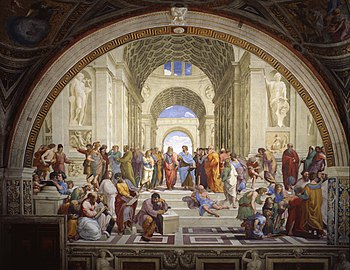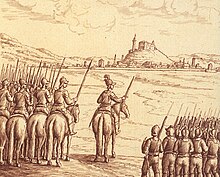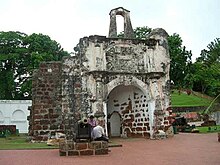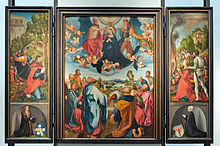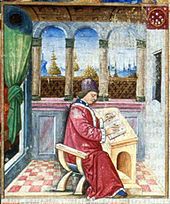1511
Portal history | Portal Biographies | Current events | Annual calendar
◄ |
15th century |
16th century
| 17th century
| ►
◄ |
1480s |
1490s |
1500s |
1510s
| 1520s
| 1530s
| 1540s
| ►
◄◄ |
◄ |
1507 |
1508 |
1509 |
1510 |
1511
| 1512
| 1513
| 1514
| 1515
| ►
|►►
| 1511 | |
|---|---|
| Albrecht von Brandenburg-Ansbach is elected Grand Master of the Teutonic Order . | The ironic discourse In Praise of Folly by Erasmus of Rotterdam is in print. |
| Raffael completes the Stanza della Segnatura . | |
| 1511 in other calendars | |
| Armenian calendar | 959/960 (turn of the year July) |
| Ethiopian calendar | 1503/04 |
| Aztec calendar | 5th rabbit - Macuilli Tochtli (until the end of January / beginning of February: 4th house - Nahui Calli ) |
| Buddhist calendar | 2054/55 (southern Buddhism); 2053/54 (alternative calculation according to Buddhas Parinirvana ) |
| Chinese calendar | 70th (71st) cycle
Year of the metal sheep辛未 ( at the beginning of the year metal horse 庚午) |
| Chula Sakarat (Siam, Myanmar) / Dai calendar (Vietnam) | 873/874 (turn of the year April) |
| Dangun era (Korea) | 3844/45 (October 2/3) |
| Iranian calendar | 889/890 |
| Islamic calendar | 916/917 (turn of the year March 30/31) |
| Jewish calendar | 5271/72 (September 22-23) |
| Coptic calendar | 1227/28 |
| Malayalam calendar | 686/687 |
| Seleucid era | Babylon: 1821/22 (turn of the year April)
Syria: 1822/23 (turn of the year October) |
| Spanish era | 1549 |
| Vikram Sambat (Nepalese Calendar) | 1567/68 (turn of the year April) |
While in 1511 in Europe after a change of alliances the Holy League replaced the League of Cambrai , which had been dissolved in the previous year , and the Italian wars continued with different omens, Portugal and Spain were expanding their respective colonial empires in America and Asia.
Under Afonso de Albuquerque, Portugal succeeds in conquering the city of Malacca and thus gains control of the Strait of Malacca , the route to the Spice Islands. The Spaniards advance into Cuba on the West Indies and Vasco Núñez de Balboa undertakes a first inland expedition in what is now Panama.
In Rome, Raphael completed the Stanza della Segnatura commissioned by Pope Julius II in 1508 , thus creating a masterpiece of the Italian High Renaissance .
Events
Politics and world events
Italian wars
- October 4th : Italian Wars : Pope Julius II allies in the Holy League with Emperor Maximilian I , the Republic of Venice , the Confederation , England and Aragon against King Louis XII. of France . France must withdraw from the occupied Duchy of Milan .
Holy Roman Empire
On February 7th, Habsburg and the Swiss Confederation conclude the second inheritance for an indefinite period of time , a contract that includes a non-aggression clause, but, unlike the first inheritance in 1477, no longer provides for any obligation to help.
- February 27 : An uprising breaks out in Friuli under the leadership of the Savorgnan family , which is suppressed by March.
- March 2nd : Duke Ulrich von Württemberg and Sabina von Bayern marry with great pomp for political reasons . The festival lasts 14 days and more than 7000 guests are invited. People around the Stuttgart Palace are fed free of charge. With the wedding Sabina renounces all inheritance in Bavaria on the father's and mother's side.
- April 2nd : Simon V becomes master of Lippe after the death of his father Bernhard VII Bellicosus .
- April 19 : After the death of Edo Wiemken the Younger , his twelve-year-old son Christoph becomes the ruler of Jever . His uncle Johann V. von Oldenburg takes over the guardianship and appoints five village heads appointed by Edo as regents. Above all, these pursue their own interests, embezzle the orphans' property and destroy Edo's efforts to create a unified and centralized territorial state. The upbringing of Christoph's sister Maria and his two other sisters is based on the typical female role of the time, namely to be married according to economically and politically favorable points of view.
- May 15th : Richard von Greiffenklau zu Vollrads is elected Archbishop and Elector of Trier. He follows Jakob II of Baden , who died on April 27th . The inauguration takes place on May 30th .
- June 23 : Maximilian I issued the Landlibell for the County of Tyrol . It stipulates that the Tyrolean estates have to do military service in defense of the country .
- September 6 : After the death of his father-in-law, Duke Wilhelm von Jülich-Berg , Johann von Jülich-Berg takes over the rule in Jülich , Berg and Ravensberg .
German medal
Albrecht von Brandenburg-Ansbach is elected as the successor to Friedrich von Sachsen, who died on December 14 of the previous year, as the 37th Grand Master of the Teutonic Order in Prussia . The order intends to shake off the army succession entered into against the King of Poland in the Peace of Thorn in 1466 . The prerequisite for this is that the newly elected Grand Master refuses to take the feudal oath against King Sigismund I. As the son of a ruling prince of the Holy Roman Empire , Albrecht appears to the chapter of the order to be particularly suitable for the office of Grand Master. Trusting in the duty of assistance of the German master and the land master of Livonia , the new grand master actually refuses the Polish king the feudal oath.
Kingdom of England
On January 1st , shortly after midnight, Catherine of Aragon , the wife of King Henry VIII of England , gave birth to a healthy boy. After almost two years of marriage and the premature birth of a daughter in the previous year, he is the first living child of the English royal couple and his birth gives him the traditional title of the English heir to the throne, Duke of Cornwall . On January 5 , the young prince in the decorated church will Friars Observant in Richmond in the name of Henry baptized, after its own royal household is set up for him. King Henry goes on a pilgrimage to the shrine of Walsingham between January 11th and 31st as thanks and organizes a tournament in honor of the prince on February 12th . However, ten days after the festivities in Westminster, the prince dies for reasons unknown.
Ottoman Empire
In the Ottoman Empire , with the support of the Janissaries , the brothers Korkud and Selim started an uprising against their father, Sultan Bayezid II , and his crown prince Ahmed, which, however, was suppressed - for the time being. Selim is defeated by his father in the battle of Uğraşdere in Thrace and flees to the Crimea, but the Janissaries again choose him as their general. He manages to beat his brother Ahmed and to be appointed commander in chief of the armed forces .
Portuguese colonies

After a first unsuccessful attack on July 25th and a siege lasting almost a month that followed, Afonso de Albuquerque , governor of Portuguese India , conquered the city of Malacca with a fleet of 16 ships on August 24th and drove Sultan Mahmud out. The city becomes an important Portuguese stronghold , as its possession brings control of the Strait of Malacca and thus the route to the Spice Islands . Fernão de Magalhães , who captured and enslaved Enrique Melaka from Sumatra, was also involved in the conquest of the city . He will accompany him on his attempt to circumnavigate the world , beginning in 1519 .
To secure this important outpost, Albuquerque lays the foundation stone for the later stone fortress A Famosa and begins intensive diplomatic efforts in the area to bring the fled merchants back into the city. On the return journey to Goa on November 20th, Albuquerque got into serious distress at night, presumably due to a navigation error, lost its flagship Flor de la Mar , which ran into a reef, and barely managed to save his life. The cargo of the Flor de la Mar lost in the sinking consists of diamonds, rubies, 60 tons of gold and gem-studded statues from a raid through Malaysian principalities and is considered to be possibly the most valuable cargo of all known shipwrecks of all time .
- The Sultanate of Al-Mahra takes possession of the islands of Socotra , which were conquered by Portugal in 1507 .
- The Portuguese are the first Europeans to land on Tidore .
- Bangkok is first mentioned in a document on a Portuguese map .
Spanish colonies in America

- February: Governor Juan Ponce de León founds the town of San Germán as the second city on San Juan Bautista , later Puerto Rico , after an uprising by the Taínos . After being destroyed by French pirates, it will be rebuilt elsewhere in December.
On June 5th, after years of legal dispute, the royal council in Spain recognized the majority of the claims of the late Christopher Columbus from the surrender of Santa Fe . Columbus' son Diego is appointed viceroy of Hispaniola , he receives jurisdiction over the islands, a fifth of the gold found on them and a tenth of the economic income there. On June 17th, the king restricted his rights to the extent that they only apply to the islands discovered by Columbus himself. Diego is not satisfied with this verdict and he initiated a new lawsuit. King Ferdinand II subsequently restricted his power by setting up a court day consisting of three appellate judges on Hispaniola.
On August 15th, the former lieutenant governor Diego Velázquez de Cuéllar , on behalf of Viceroy Diego Columbus, crossed with 400 men from Hispaniola to Cuba and founded the first city of Baracoa at the point where Christopher Columbus first set foot on the island . Among the expedition participants are his secretary Hernán Cortés , Bartolomé de Las Casas , Pedro de Alvarado and Cristóbal de Olid . Cuéllar immediately faces a guerrilla war with the Taíno tribe under the chief Hatuey , who had fled from Hispaniola to Cuba shortly before the Spaniards .
- While an indictment of mutiny against him is being prepared in Spain, Vasco Núñez de Balboa , who has been governor of Darién in what is now Panama since the previous year , undertakes a first expedition into the interior of the country.
science and technology
- The St John's College of the University of Cambridge was founded.
- The Laienspiegel by Ulrich Tengler , one of the most important legal books of the early modern period, appears in a revised form with six new woodcuts by Hans Schäufelin in Augsburg.
Culture
| Culture | |
|---|---|
|
Raphael Rooms
Raphael completes the Stanza della Segnatura commissioned by Pope Julius II in 1508 in the Apostolic Palace in Rome . The determining themes of the room are the three highest principles of the human mind: the true, the good and the beautiful. These are shown in the four wall and vault frescoes, which have the Disputa del Sacramento , the School of Athens , the cardinal and divine virtues and the law as well as Parnassus as their subject. Theological truth finds its expression in the Disputa of the Most Holy Sacrament, which relates to the triumph of the Christian religion. In the Athens School , Raphael painted natural truth, philosophical reason, in the form of ancient philosophers in front of a Renaissance architecture. Raphael shows the good in the cardinal and godly virtues and the law as allegories of the cardinal virtues of bravery, prudence and temperance and the Christian virtues of faith, hope and love, which were painted on the bezels of the wall. In Parnassus , the muses subordinate to Apollo and ancient and modern poets complete the spiritual cosmos of this space. The vault summarizes in allegorical form man's abilities for philosophy, theology, poetry and justice.
The Heller Altar
Matthias Grünewald completes the Heller Altar started by Albrecht Dürer's workshop , a triptych commissioned by the patrician Jakob Heller for the Dominican Church in Frankfurt am Main . Heller entrusted Dürer, who works in Nuremberg , with the central panel, the inner wings and the first left and right outer wings . He left only four panels for the left and right second outer wing - although these, like the former, were to be made in the particularly difficult grisaille technique - to Grünewald , who was probably located in Aschaffenburg . At its final destination, the work is assembled.
Further works of fine art
- Giovanni Bellini workshop : The Venetian Embassy in Damascus
- Michael Heuffner creates the winged altar of the hospital church in Hof . In the same year he died at the age of 28 in Zwickau.
literature
- The ironic discourse in praise of the folly by Erasmus of Rotterdam , which is part of the fool's literature , which he wrote in 1509 during a stay with his friend Thomas More in England, appears in print for the first time in Paris and Strasbourg.
society
- The publication Warhrachtig Sumarius der gerichts hendel is printed by Johann Hanau in Frankfurt an der Oder in an early New High German and in a Middle Low German version.
- In England come horse races on.
- The first coffee houses were built in Mecca and were subsequently closed again for some time due to a ban on coffee with severe fines .
- The oldest preserved curling stone is produced.
religion
- October 24th : Cardinals Guillaume Briçonnet , Bernardino López de Carvajal , Francisco Borja , René de Prie and Frederico Sanseverino , who took part in the unrecognized Council of Pisa , are excommunicated and deposed by Pope Julius II . The council continues undeterred.
- November 19 : Johann III. von Rosenberg is elected Grand Prior of the Strakonice Coming of the Johanniter.
The Cologne butcher Johannes Pfefferkorn , a Jew who converted to Christianity, wrote the anti-Jewish pamphlet hand mirror against Johannes Reuchlin and his positive opinion on the Talmud . Reuchlin replied in the fall with the typeface Augenspiegel , which was printed in Thomas Anshelm's print shop and then appeared at the Frankfurt Book Fair . The dispute escalated in the next few years despite an imperial silence command, with large parts of the educated elite in Germany and beyond Germany taking sides for one of the two sides, and culminated in the so-called dark man's letters of 1515 .
Immediately after the death of Archbishop Johann III. on December 4, his previous coadjutor Christoph von Braunschweig-Wolfenbüttel takes over the office of Archbishop of Bremen , with which he is enfeoffed by Emperor Maximilian I the following year.
The Archbishop of Bremen Johann III. Missale secundum ritum ecclesie Bremense ordered by Rode von Wale is completed. This missal, in accordance with the customs of the Bremen Church, describes the rite for Holy Mass that was only valid in the Diocese of Bremen in the Middle Ages . It contains the fixed and changing biblical texts, prayers and chants for church services in Latin and is in use until 1532 .
Disasters
After the North Sea coast in the two previous years by several severe storm surges was concerned, breaking on Jan. 16 , the Antoni tide over East Friesland in. The storm surge, also known as the flood of ice, is associated with strong ice drift and hits the dikes at a time when, after the All Saints Flood in 1510 , they could often not be repaired. Many villages and parishes have to be abandoned. There are significant land losses on the Dollard and Jade Bays . Before Sande, this affects Oldebrugge, Bordum , Bant , Ahm, Ellens, Havermonniken, Hiddens, Scheidens and Seediek, among others . Arngast becomes an island in the Jade Bay. Dollart and Jadebusen reach their greatest extent, and a breakthrough occurs between Jade and Weser .
- March 26th : A strong earthquake shakes the Balkans and affects northern Italy . There are an estimated 6,000 fatalities.
Born
Date of birth saved
- January 1 : Henry Tudor, Duke of Cornwall , English heir to the throne († 1511)
- January 19 : Adolf von Schaumburg , Archbishop of Cologne († 1556 )
- April 2 : Ashikaga Yoshiharu , Japanese Shogun († 1550 )
- May 16 : Andreas Hyperius , German theologian and reformer († 1564 )
- June 6 : Jakob Degen , German lawyer, doctor and philosopher († 1587 )
- June 18 : Bartolomeo Ammanati , Italian sculptor and builder († 1592 )
- July 9 : Dorothea von Sachsen-Lauenburg , Queen of Denmark and Norway († 1571 )
- July 30 : Giorgio Vasari , Italian court artist and biographer († 1574 )
- August 24 : Jean Bauhin , French doctor († 1582 )
- October 22 : Erasmus Reinhold , German astronomer and mathematician († 1553 )
- November 8 : Paul Eber , German theologian, hymn poet and reformer († 1569 )
- November 15 : Johannes Secundus (Jan Nicolai Everaerts), Dutch Neo-Latin poet, painter and sculptor († 1536 )
- November 17 : Jacob Bording , Flemish doctor († 1560 )
- December 18 : Andrea Cornaro , Cardinal of the Catholic Church († 1551 )
- December 21 : Erasmus Ebner , German diplomat, scholar and statesman († 1577 )
Exact date of birth unknown
- Diego de Agüero y Sandoval , Spanish conquistador († 1544 )
- Ludolf X. von Alvensleben , German nobleman and statesman († 1596 )
- Friedrich Bernbeck , Mayor and designer of the Reformation in Kitzingen († 1570 )
- John Hamilton , Lord Keeper of the Seal and Treasurer of Scotland, Archbishop of St Andrews († 1571 )
- Thomas Howard , English nobleman († 1537 )
- Amato Lusitano , Portuguese doctor and botanist († 1568 )
- Nicola Vicentino , Italian composer and music theorist († 1572 )
Born around 1511
- Lope de Aguirre , Spanish conquistador († 1561 )
- Caspar Vopelius , German mathematician, astronomer and cartographer († 1561 )
- 1511/ 1512 : Giovanni Sallustio Peruzzi , Italian architect († 1572 )
Died
First half of the year

- January 4th : Ludovico Gonzaga , Bishop of Mantua (* 1460 )
- January 9 : Demetrios Chalkokondyles , Greek humanist, scholar and professor of the Greek language in Italy (* 1423 )
- January 20 : Oliviero Carafa , Archbishop of Naples and Cardinal of the Roman Catholic Church (* 1430 )
- February 3 : Johann Serlinger , nominated Bishop of Seckau
- February 11 : . Charles II d'Amboise , governor of Paris and Marshal of France and Admiral of France (* 1472 / 73 )
- February 22nd : Henry Tudor, Duke of Cornwall , English heir to the throne (* 1511)
- March 15 : Georg von Gemmingen , Catholic priest, canon in Worms and Speyer, and vicar general of the Prince Diocese of Speyer (* 1458 )
- April 2 : Bernhard VII Bellicosus , sovereign of the Lippe rule (* 1428 )
- April 19 : Edo Wiemken the Younger , last male ruler of the Jever reign (* around 1454 )
- April 27 : Jacob II of Baden , Archbishop and Elector of Trier (* 1471 )
- May 3 : Oswald I , Count von dem Bergh (* 1442 )
- May 10 : Andreas von Sonnenberg , German nobleman from the House of Waldburg and Count von Sonnenberg (* 1472 )
- May 24th : Francesco Alidosi , Bishop of Pavia, Cardinal of the Catholic Church (* around 1455 )
- May 29 : Nicolás de Ovando , Spanish soldier and governor of Hispaniola (* 1451 )
- June 13th : Hedwig of Saxony , Princess of Saxony and Abbess of the Imperial Monastery of Quedlinburg (* 1445 )
- June 15 : Johannes V , Bishop of the Ratzeburg Diocese (* before 1450)
Second half of the year
- July 2 : Hadim Ali Pascha , Grand Vizier of the Ottoman Empire (* before 1485 )
- July 6th : Adolf III. , Count of Nassau-Wiesbaden-Idstein (* 1443 )
- July 12 : Albrecht I , duke in the Silesian principalities of Münsterberg and Oels and Count von Glatz (* 1468 )
- August 23 : Francesco Argentino , Cardinal of the Catholic Church (* around 1450 )
- August 24th : Albrecht von Bibra , Canon of Würzburg and Bamberg
- September 6th : Ashikaga Yoshizumi , 11th Shogun of the Ashikaga Shogunate (* 1478 )
- September 6th : Wilhelm III./IV. , Duke of Berg and as Wilhelm IV. Duke of Jülich and Count of Ravensberg (* 1455 )
- October 4th : Pedro Luis de Borja Llançol de Romaní , Cardinal of the Catholic Church, Archbishop of Valencia (* 1472 )
- October 18 : Philippe de Commynes , French diplomat and historian and advisor to the kings Louis XI. and Charles VIII (* around 1447 )
- November 4th : Francisco de Borja , Cardinal of the Catholic Church, Bishop of Teano and Archbishop of Cosenza (* 1441 )
- November 5 : Gabriele de 'Gabrielli , Cardinal of the Catholic Church, Bishop of Urbino and Papal Secretary (* 1445 )
- November 23 : Anne of York , English princess (* 1475 )
- November 29th : Ursula Cotta , wife of the patrician and mayor of Eisenach, Conrad Cotta, supporter of Martin Luther
- December 3 : Johann Pfotel , German legal scholar and diplomat (* 1445 )
- December 4th : Johann III. Rode von Wale , Archbishop of Bremen (* around 1445 )
Exact date of death unknown
- before October 12: Johannes Tinctoris , Franco-Flemish composer and music theorist (* around 1435 )
- Michael Heuffner , German sculptor and painter (* 1483 )
- Johannes Petri , German printer (* 1441 )
- Kemal Reis , Ottoman pirate, admiral and cartographer (* 1451 )
- Matthias Ringmann , German humanistic philologist and poet, who is responsible for the designation of the name America (* 1482 )
- Hartwig von Stiten , Mayor of the Hanseatic City of Lübeck
- Yoshida Kanetomo , religious reformer of Japan (* 1435 )



